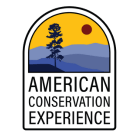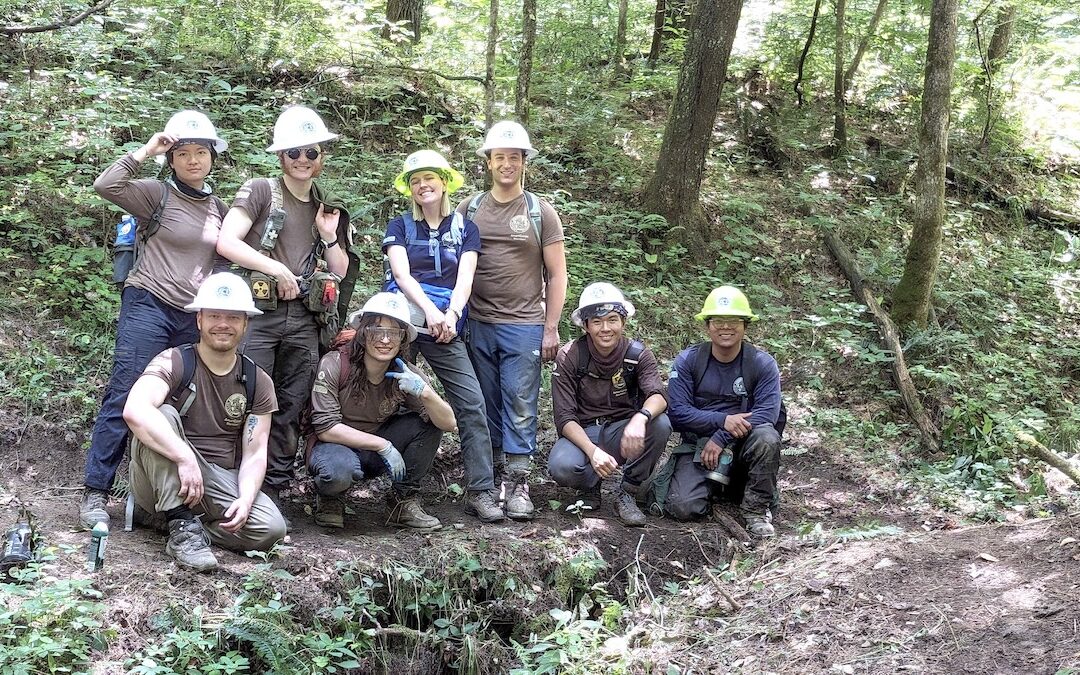American Conservation Experience has launched many conservation careers. While many emerging conservation professionals have historically looked toward federal land management agencies for career paths, there are many additional avenues. While traditional career pathways are shifting, there are still many impactful conservation-related careers for individuals with degrees in conservation, environmental science, biology, forestry, and related fields.
Here are examples of conservation-related positions outside of federal land management agencies:
1) State and Local Government
- State Parks and Wildlife Agencies:
- These agencies manage state parks, wildlife refuges, and natural resources. Roles include park rangers, wildlife biologists, environmental educators, and land managers.
- Many states are increasing their conservation efforts, creating new opportunities.
- Examples of new opportunities include:
- Water Resource Management: States are focusing on water quality monitoring, watershed restoration, and sustainable water use practices. This creates jobs for hydrologists, water quality specialists, and environmental technicians.
- Many states continue to invest in renewable energy projects (solar, wind, etc.), which require environmental scientists for impact assessments, site selection, and monitoring.
- Addressing issues like drought and pollution requires professionals to conduct research, develop policies, and implement remediation projects.
- County and Municipal Governments:
- Local governments are increasingly involved in urban forestry, watershed management, and environmental planning.
- Positions like environmental planners, sustainability coordinators, and natural resource specialists are becoming more common.
2) Non-Profit Organizations
- Land Trusts:
- Land Trust organizations focus on land conservation through acquisition and easements. Roles include land stewards, conservation planners, and outreach coordinators.
- Environmental Advocacy Groups:
- Organizations like The Nature Conservancy, Sierra Club, and others employ scientists, policy analysts, and program managers.
- Education Centers:
- Nature centers and environmental education organizations offer opportunities to teach about ecology and conservation.
- Restoration and Stewardship Organizations:
- These nonprofits focus on ecological restoration of damaged areas, and require people with field skills, and ecological knowledge.
- Additional Nonprofit Organizations:
- Aquariums, zoos, nature conservancies, gardens
- National Park Friends Alliance Groups
- Membership organizations (Horticulture societies, science societies, etc)
- Outdoor camps and environmental education – groups seek those who are passionate about outdoors and conservation to work with participants as well as behind the scenes
- Conservation Corps
- There are over 150 conservation corps (including ACE) across the US that feature numerous roles and opportunities to make an impact.

ACE Crew Supports Land Trust of Napa County
3) Private Sector
- Environmental Consulting Firms:
- These firms provide services related to environmental impact assessments, habitat restoration, and regulatory compliance.
- Roles include environmental scientists, ecologists, and regulatory specialists.
- Renewable Energy Companies:
- The growing renewable energy sector needs professionals with expertise in environmental science and land management.
- Roles include environmental compliance officers, land use planners, and impact assessment specialists.
- Sustainable Agriculture and Forestry:
- Private companies involved in sustainable agriculture and forestry practices employ professionals with knowledge of ecology and land management.
- Sustainable forestry consultants, and sustainable agriculture researchers are needed.
- GIS and Remote Sensing Companies:
- Companies that specialize in Geographic Information Systems (GIS) and remote sensing need people with skills in analyzing spatial data for environmental applications.
- Arborist companies, greenhouses:
- Tree service providers rely on knowledgeable professionals to assist their cliens
- Greenhouses offer plant care opportunities where professionals may utilize their horticulture and gardening skills
4) Research and Academia
- Universities and Research Institutions:
- Research positions and teaching opportunities are available for those with advanced degrees.
- Private Research Organizations:
- Organizations like the Cary Institute of Ecosystem Studies conduct research on ecology and environmental science.
- University Sustainability
- In addition to research positions, universities and other educational institutions often feature sustainability roles
5) Emerging Fields
- Adaptation:
- This rapidly growing field needs professionals to develop and implement strategies to address the increasing number of severe weather events and other disasters.
- Urban Ecology and Green Infrastructure:
- With increasing urbanization, there’s a growing need for professionals who can design and manage green infrastructure in cities.
- Citizen Science and Community Engagement:
- Organizations are increasingly relying on citizen science to collect data and engage communities in conservation efforts.
Recommendations for Individuals:
- Skill Development: Skills in GIS, data analysis, and communication, are highly valued across various sectors.
- Networking: Be sure to network with professionals in different conservation fields.
- Volunteer and Internship Opportunities: Seek volunteer or internship opportunities with nonprofit organizations or private companies to gain experience to bolster your resume and grow your network.
- Tailored Resumes and Cover Letters: Always tailor your resume and cover letters to highlight the skills and experience relevant to each specific job opening.
- Consider Further Education: You may want to check out certifications in specialized areas to boost your skillset.
- Focus on transferable skills: You likely have valuable transferable skills. These include, field work, teamwork, problem solving, and resilience. These should be highlighted on your resume, and in interviews. Use AI for ideas on how to best translate skills for the specific role(s).
By exploring these career paths and developing the necessary skills, you can apply your knowledge and passion to further conservation efforts, even in a changing job market.

